Cell phone addiction is a serious issue in teenagers.
Pew Research shows that a whopping 54% of teens in the United States spend too much time on their phones.
Most teens spend free time on their phones while others use theirs to learn new things or connect with friends.
Truly, Smartphones can be very useful to teens especially for online research and casual use on social media. But when should a parent be worried about their teen getting attached to technology?
When do reliance on the internet and cell phone turn into an addiction that affects the child negatively?
What can parents do to help their kids curb excessive phone use?
With so many bugging questions that are yet to be answered, this article will provide useful answers and help you to identify the signs and effects of cell phone addiction in teens and how to support them — given that nearly 80% of teens check their mobile devices at least hourly, according to a CNN poll.
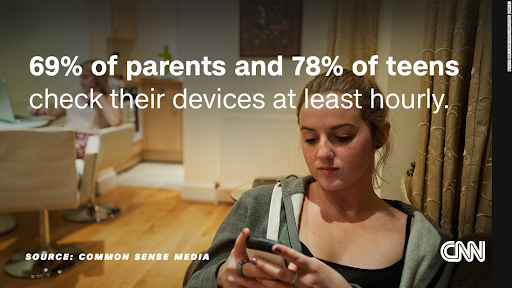
How Much Time Do Teens Spend on Their Phones?
According to statistics, an American teenager spends an average of 6.3 hours staring at their cell phone screen.
This is similar to the same amount of time an average adult spends working. 6 hours is huge and it could leave serious debris on the body and mind.
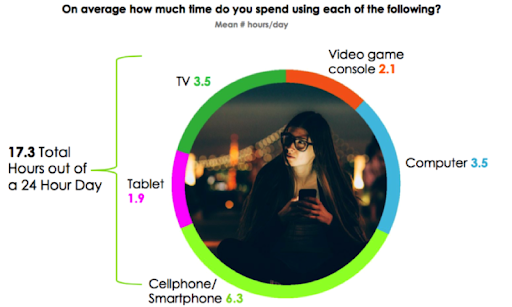
Cell phone addicted teens exhibit several signs of mental health issues. Anxiety and depression are both common occurrences in teens.
Given the misinformation on social media (which comes from excessive use of the internet-enabled cell phone), we’re experiencing a rise in teen suicide rates. The societal dependence on mobile phones has caused a lot of havoc than good.
You may not fully understand the extent to which a teen is addicted to their cell phone, but just observe their behavior when they hear the sound of a notification alert on their cell phone.
For some teens, it can be very difficult to resist but impossible for most of the teens that are battling with phone addiction. I guess this is one of the signs you should look out for in your teen.
Why Teenagers Are Addicted to their Phones
The truth be told, teens and technology are like two Siamese twins that can’t be separated.
Parents shouldn’t attempt to completely prevent their kids from using smartphones – preventing addiction is the pursuit — since it’s already causing family conflicts, according to a survey conducted for Common Sense Media.
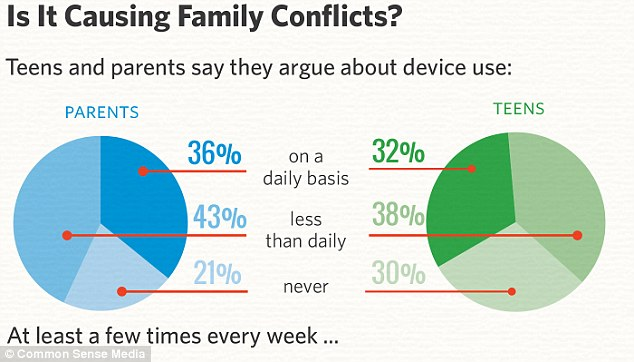
Teens use technology in the classroom to improve their grades.
They also connect and meet new friends on social media through various platforms and apps. And with so many tasks to do every day, teens use apps to stay organized and productivity (in most cases).
There’s so much pressure in today’s mobile-first environment. Cell phone use has become a necessity — teens can’t do without it. Even recreational activities that are designed to help teens relieve stress are all attached to mobile phones.
As parents, there’s a responsibility to ensure that our kids use their phones to keep up with their busy lives and learn, but it shouldn’t result in more stress. Parents can help teenagers navigate the stressful and distracting world of technology.
Smartphone Addiction: What Does it Cause?
Smartphone addiction is a concept that examines the fear of not keeping up with the happenings on the internet or cellular service. It happens in both teens and adults, but more pronounced in the former because of the stage they’re in.
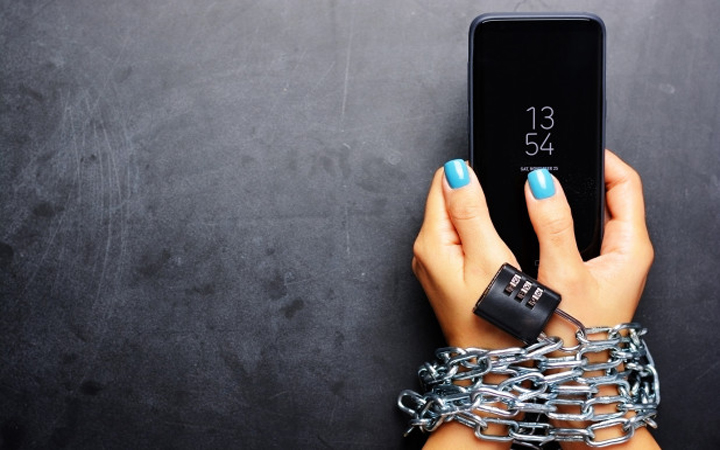
Several studies have shown a correlation between mental health issues and smartphone addiction. But correlation doesn’t necessarily mean causation.
Therefore, even though it’s popularly known that phone addiction leads to loneliness, anxiety, and depression, the major concern is whether or not these symptoms are primarily caused by addiction.
Here’s another school of thought:
Are people with anxiety, depression, and other vices more prone to become dependent on their smartphones?
In new research that was conducted by the University of Arizona to understand the connecting line between mental health and smartphone use, a group of 18 to 20-year-olds took part in it.
These participants are regarded as “older adolescents” by researchers — and they are among the first to have witnessed the transformative power of smart technology (the first iPhone was released in 2007).
“Dependence” was the major focus of the study. The researchers examined a person’s psychological reliance on a smartphone, not general usage.
Participants answered questions such as “I panic when I can’t use my phone,” in addiction to other questions related to depression and loneliness using a four-point scale.
In the end, the researchers deduced that indeed, smartphone addiction is a predictor for anxious and depressive symptoms.
Signs of Cell Phone Addiction in Teens
As a parent or guardian, the easiest way to help your teen deal with cell phone addiction is by understanding the signs and symptoms. These will be indicators that your kid is being controlled by mobile tech. force and needs your help.

Here are some of the signs to look out for:
1). Teen Spending Hours On Their Cell Phone
If you observe that your child or ward is spending hours on their cell phone, there’s a chance they’re battling with a concept known as “Tolerance.”
It means the insatiable quest to reach a desired high. This is similar to alcohol or drug abuse.
This has become a norm in our day — since millions of people are now using cell phones, coupled with increased downloads that make the next shiny app or platform a click away. Even students aren’t left behind…
60% of U.S. college students say they’re addicted to their cell phones.
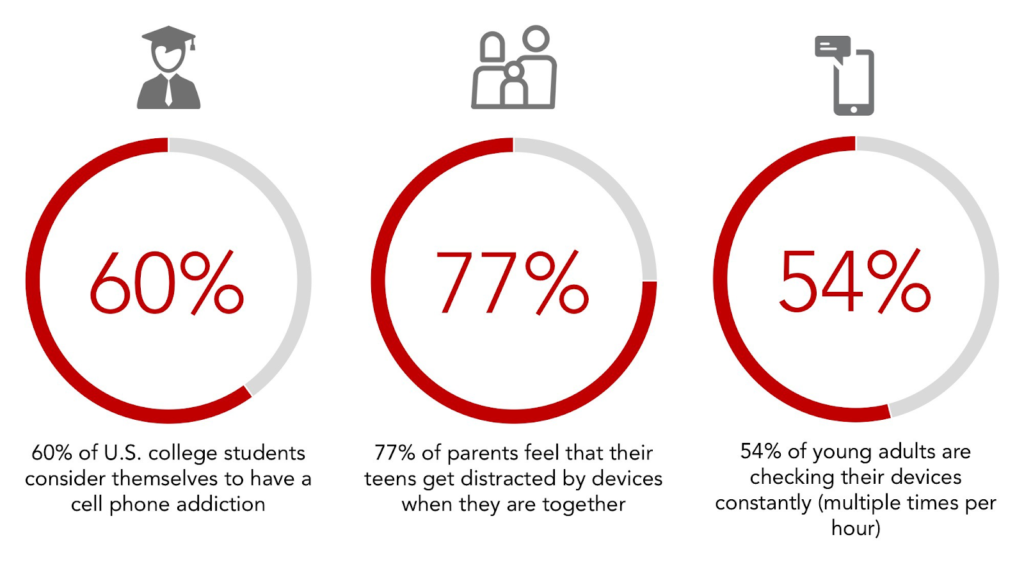
If the only thing a teen does at leisure or while hanging out with friends is to use their cell phones, there’s a risk of addiction.
2). Teen Becoming Agitated When Their Cell Phone is Misplaced
How does your teen react when they misplace their cell phone. Of course, they have to be concerned, but getting all-worked up over a mobile device can be a sign of an addiction. A recent study shows that 68% of older teenagers are afraid of losing their phone.

As a mom, dad, or guardian, you might notice some withdrawal symptoms such as irritability, desperation, panic, stress, and even anxiety in your teen — when they’re separated from their cell phone.
It doesn’t matter how long or whether they end up losing the phone, does it hinder their normal life in any way?
3). Complaints from People Over a Teen’s Phone Use
Another sign of cell phone addiction in a teen is when people (friends, relatives, colleagues, or even acquaintances have complained about your child’s phone use.
You have to take this ‘sign’ with a grain of salt because not all complaints are true — but when it’s from people who you respect and value their opinions, you shouldn’t pay a deaf ear to their complaints. “
Conscious use of phones while driving, riding a bike, or in prohibited context should be avoided,” says Justin Baker.
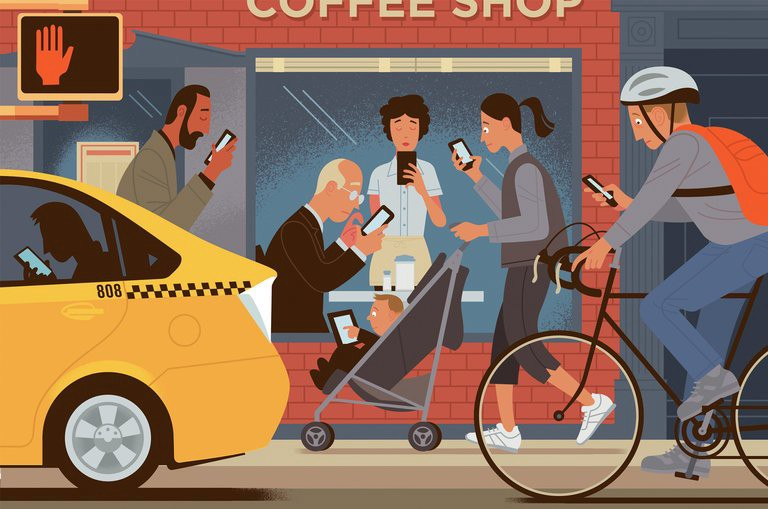
This can result in an outcome known as “Conflict” which is common in cell phone addiction issues.
It may not even come as a complaint. If your teenager lets cell phone beeps or notification sound interfere with their social engagements or vacation time, it could be a source of concern.
4). Switching Between Multiple Devices and Applications
This sign is an obvious indicator of some form of teen cell phone addiction.
Switching between multiple applications and multitasking at the same time is popular with teens because smartphones have several features that allow that.
Modern phones even allow users to share screen — so that they can use 3 to 4 platforms or applications at the same time.

Some teenagers can’t do one thing at a given time on their cell phones. They’d rather prefer to use social media, or texting their friends, or playing a new game on the go.
This creates a loop that keeps them stuck.
5). Inability to Put Away the Cell Phone
Most teenagers struggle to put away their cell phone for a few hours. This can cause a situation popularly referred to as “Relapse.”
It occurs when a teen is determined to cut back on cell phone use but finds him or herself being controlled by a strong force that forces them to reach for the phone.
Relapse is common with people undergoing therapy or treatment associated with drug abuse. But it happens to teens who are addicted to their cell phones.
An average of 80% of recovering addicts experiences at least one mild relapse, according to PsychologyToday.
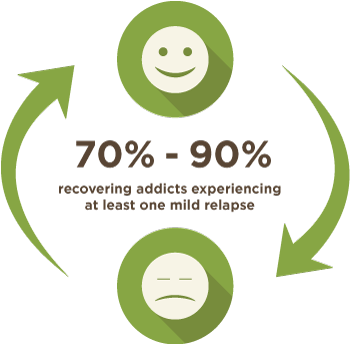
Since most teenagers haven’t developed their mental capacities, it can be a struggle to consciously create new habits or resist the urge to reach for their cell phones.
New habits such as reach a hardcopy book or playing outdoors with friends can help the teen practice being “unplugged” for a few hours each day.
If a teen has been self-diagnosed with cell phone addiction, half the battle of getting the right solution is already won.
There’s no need to give up on cell phone use entirely, but there should be times when your kid should stay away from their phones and create new habits and develop new skills.
To help your teenager, you can turn off the phone and leave it in the car or the study. As much as possible, the cell phone should be out of reach for your kid. You may also want to adopt a nighttime charging practice in any room, but definitely not the bedroom.
Help your teenager to create a new lifestyle and enjoy life without relying on a cell phone. After all, there was life before the cell phone and there will be life, even after the cell phone is gone (will it ever be gone?).
6). Checking Cell Phones First Thing in the Morning
A lot of teenagers check their mobile phones first thing in the morning. 46% do it before getting out of bed, while 80% do so without brushing their teeth. It’s funny but true!
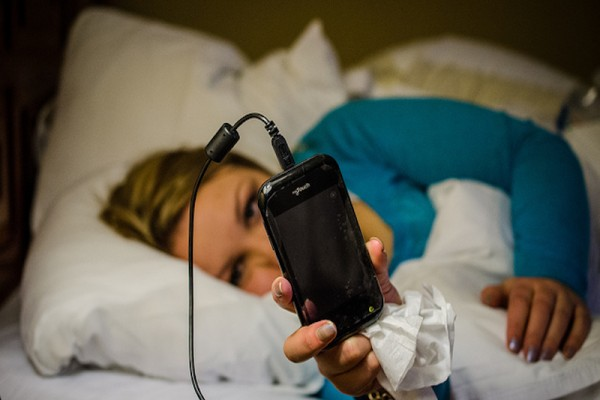
For teenagers, when this becomes a daily routine, it can negatively affect their sleep — because the human brain is wired to respond to stimuli that we’ve developed over a long time. The brain can pick the signals and translate them as being natural.
This behavior is known as Salience, which can be integrated into the human brain.
In some cases, routinely checking cell phones can dominate their thinking and emotions. This would cause them to sleep with their phones next to their beds.
A quick way to help your teen is to keep the phone out of reach, until they’re fully awake and ready for the day.
Casual Phone Use Vs. Addiction
How does casual use of cell phones differ from addiction? How can parents determine what the teen’s apparent obsession with a smartphone becomes an addictive behavior?
I’m sure you know how difficult it can be to attempt to communicate with a teen who can’t put away their cell phone?
Given that teens use their smartphones for both productive and unhealthy ways, including for academic research and personal use (often at the same time), a good way to draw the line is by understanding how they use their smartphones and less on how long they use it.
It’s all about striking a balance between the amount of time and how teenagers use their cell phones and what objective that use serves them.
For example, teenagers can use YouTube to learn new topics as well as watch funny videos (i.e., academic and personal uses).
Truly, distinguishing between normal daily cell phone use and addicted use is important. Since the rule isn’t set on a stone, here are some of the questions you need to ask — it’ll shine a brighter light on that thin line:
- Does my teen neglect social events to be with their phone instead?
- Is my teen’s relationship with siblings, friends, or school work negatively impacted by smartphone use?
- What major eating and sleeping behaviors are obvious in my teen?
- Does my teen get irritated or even violent when the phone is withdrawn from them?
Note: These are not the only questions or signs to look out in your teen. Every parent knows their child, so it’s easy to study their behaviors — especially when it comes to cell phone use.
Teen Cell Phone Addiction: How Parents Can Help
In this section, we’ll discover the right steps that parents can take to help a teen who’s addicted to their mobile phone.
Bear in mind that these ‘tips’ may not provide an overnight result — parents must keep at, encourage their teens to develop strong will and control and make them see reasons why they should never be addicted to anything — drug, games, movies, phone, etc.
Let’s dive in.
1. Educate Your Teen
Given the importance of a mobile phone; communicating with your teen and help them explore the world for good, you need to give your teen the best device that will serve them well.

But there’s a need for education. Teach them how to use the phone in a good way; while unveiling the dangers of modern technology. Make sure you set boundaries and do everything with love — so that your teen knows it’s for their good.
While educating your teen, you should adopt some degree of monitoring. That way, you’ll keep a close tab on your teen when they’re not with you.
Getting addicted to a smartphone is easy. Before giving your teen control, provide tools and let them know they can always ask questions.
2. Provide a Structure
Teenagers want to be loved and feel they’re a part of something big. So you need to provide a structure when giving your child a phone.
Be clear on what you want them to do with the cell phone, how often they should use it, and even challenge them to make better use of it for a prize.
Set a framework of expectation that will persuade your teen to stick to a consistent routine. This is a great way to support young people and get the best from them.
As a parent, there should be a culture in your home. The use of cell phones must be incorporated into this system of culture — as your teen grows, they’ll come to terms with it. After all, it’s a structure that ‘mom’ says to follow.
3. Set Boundaries for PhoneUse
In addition to providing a structure in your home, you also need to be clear on what to do in certain areas around the home.
For example, should teens use phones while eating? Of course, that’s a no-no!
So when you’re on a family outing, attending social events, at the dining table, or studying, these times and places aren’t good for teens to use their cell phones. Relationships come first and must be respected.
4. Set a Good Example
As a parent, you can’t possibly attempt to help your teen with cell phone addiction if you’re always glued to your phone. You don’t want kids to learn inappropriate behavior concerning phone use in the home.

If you’ve set a structure or established screen-free zones, you have to obey it. Because teens, most of the time, learn from their parents. They learn from observation!
5. Create a Policy
When should your teen(s) use their cell phones and laptops? Well, there’s never a standard time but when they’re in bed, they shouldn’t use it.
Because bright screens can negatively affect sleep, which, in turn, could lead to insomnia.
It’s wise to create a plan that will help your teens to check cell phones and laptops — it could be in the evening and after 8:00 a.m. Blue lights from cell phones can harm sleep, so keep them away.
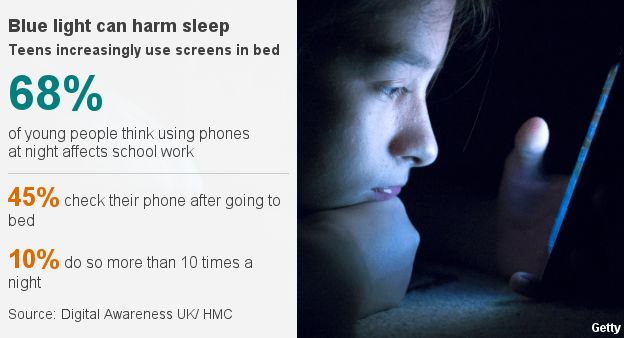
Conclusion
If you feel or notice signs of phone addiction in your teen, you should implement the tips above to help them curb the negative effects.
You may also want to speak to a mental healthcare provider for advice on how to help your teen learn healthy habits so they can take control of their life and overcome every cell phone addiction. Because they can do it!
There are different rehabilitation options available for cell phone addicted teens — a quick search online will show you a nearby center.

